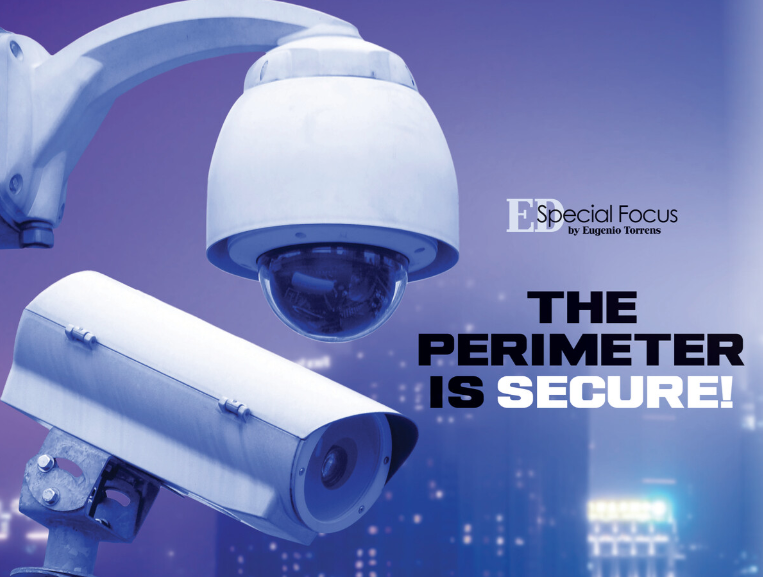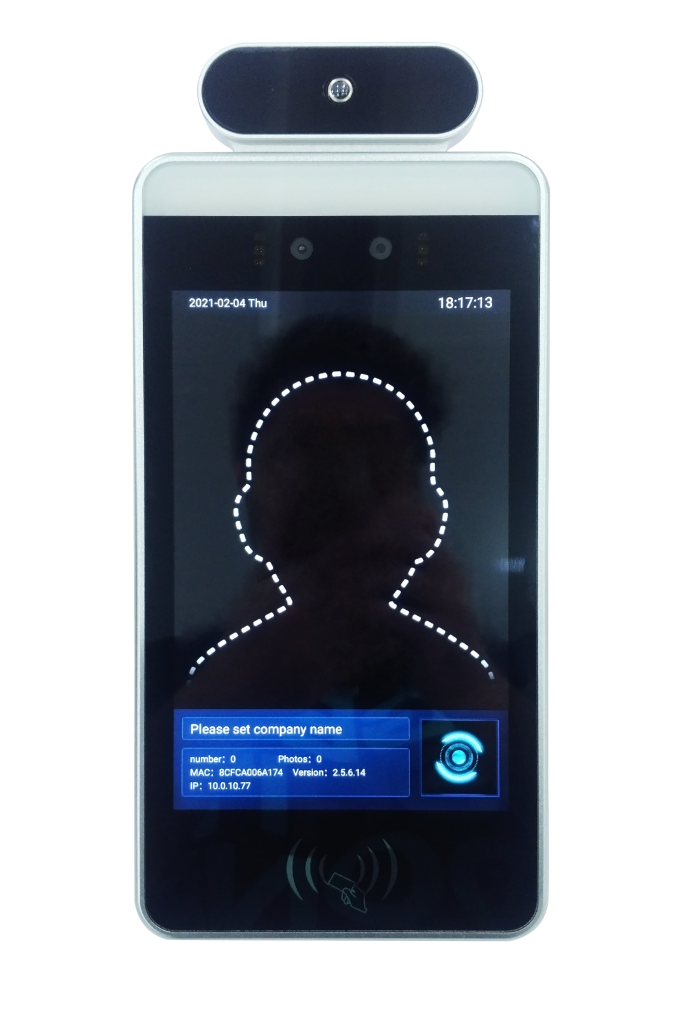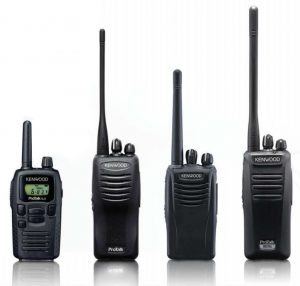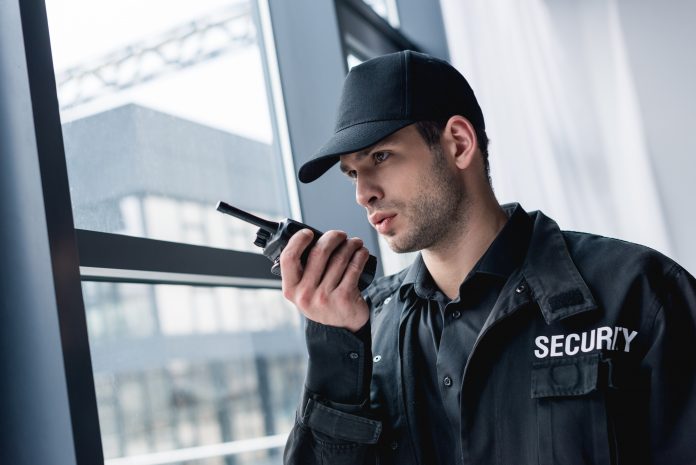(Note: This story appears in the March 2021 issue of ED Magazine)
*Story by Chuck Wilson and Gary Sikorski
Together, Chuck Wilson and Gary Sikorski have half a century of security intel. For them, it all boils down to utilizing options that yield your highest ROI.
Between their 50 years of experience in law enforcement, Charles Wilson and Gary Sikorski are more than qualified to offer insight into security solutions for your club.
In this article, they discuss some essential equipment aspects of your adult nightclub security operation. This list is not all-inclusive, but from their experience, they have focused on those items with the highest ROI (return-on-investment) in protecting customers, staff, and of course, the business itself. It is crucial to support your most important investment—your staff—with the tools, technology, and equipment to provide the safest environment possible.

Surveillance (CCTV) technology/weapon package screening
The pros and cons of implementing a robust surveillance camera system within adult nightclubs has been a highly- debatable topic for many years. Like at any other bar or entertainment venue, camera systems unequivocally provide an extra layer of security and safety for employees, clients, and the interior/exterior of the physical property.
Adding surveillance cameras to any club’s security plan increases the effectiveness of the security team and management. Surveillance cameras can also satisfy local governmental mandates for club operation and provide a reduction in insurance costs.
As we continue to address COVID-19, many entertainment venues utilize surveillance systems to conduct contact tracing for both employees and visitors. With the advent of the CSI television and movie culture, many customers also expect you to leverage camera footage to help solve any on-premises incident where they believe they are victims.
Investing in a ton of cameras for the sake of having cameras is often neither practical nor necessary, based on club size and the identified risk of incidents occurring there.
In today’s security world, surveillance cameras provide one of the most beneficial uses of technology; however, another layer of technology that should be considered in any overall security plan is weapon screening equipment. At a minimum, adult nightclubs should invest in handheld security metal detectors (wands) that come in various sizes and capabilities. While this is a much more intrusive way to conduct customers’ weapon screenings, it provides the best level of flexibility, allowing the club to determine when to implement its screening protocols.
Properly placed cameras can often allow the security staff to focus more on customer relations services and preventative security protection measures, especially from a situational awareness perspective.
As with the installation of surveillance systems within any commercial/retail property, the primary goals for surveillance cameras are to provide a definitive source of evidence when investigating any incident and, more importantly, provide a visible deterrent to individuals contemplating the commission of any forbidden or illegal acts. Nightclubs can also utilize surveillance cameras to mitigate allegations brought forward against the club relative to negligence claims or actions by its staff. Surveillance footage has exonerated many companies in civil court proceedings involving customers who have levied groundless accusations.
When surveillance cameras first came to the forefront of security planning, equipment costs and privacy issues were the most significant hurdles. Costs have dramatically declined, and subsequent monitoring service costs have become very nominal with recent cloud-based systems. Remote-controlled manual or high-resolution multi-view digital pan/tilt/zoom (PTZ) cameras versus fixed cameras increase system costs, as does adding cameras with facial recognition or AI functionality. Facial recognition cameras can now enhance the customer experience by allowing for VIP notifications or other targeted promotional or marketing campaigns.
Most people today possess an electronic device (i.e., a cellphone, smartwatch, tablet) with a camera, so people’s expectation of privacy is almost nonexistent. Aside from an individual’s home or a restroom/locker room, any rational person understands the very high likelihood of being recorded in most public places.
In today’s security world, surveillance cameras provide one of the most beneficial uses of technology; however, another layer of technology that should be considered in any overall security plan is weapon screening equipment. At a minimum, adult nightclubs should invest in handheld security metal detectors (wands) that come in various sizes and capabilities. While this is a much more intrusive way to conduct customers’ weapon screenings, it provides the best level of flexibility, allowing the club to determine when to implement its screening protocols.
For larger clubs, walk-through thermal-imaging systems, which replace metal detectors and include temperature scanners, are a less intrusive and viable option and provide a higher level of certainty relative to weapon detection. It also mitigates virus spread and identifies individuals who may be infected with a virus before entering the nightclub. Walk-through systems are less obstructive and can match the club’s entrance’s aesthetics, offering a better customer experience.
 ID scanner/ID checker
ID scanner/ID checker
Checking ID upon entry is one of the most routine tasks but also one of the most important. It verifies that the individual is of legal age while ensuring that their ID is valid. Essentially, there are three ways to accomplish this, from low to high tech. Low-tech is the stereotypical doorman armed with just a flashlight and a discerning eye. Mid-tech options employ manual ID verification devices/tools like ID checking guides and handheld or counter-top UV counterfeit document detectors, confirming ID security features and helping spot altered IDs.
High-tech options utilize digital ID scanners that spot fake IDs and capture information to assist in identifying a subject after-the-fact if needed. These systems typically scan barcodes or swipe magnetic strips on government-issued ID cards to verify authenticity and capture key data. They can also flag individuals previously banned (and share that information chain-wide, if desired), confirm cover payment, and prevent multiple users of the same or duplicate ID. There are also contact-less systems that allow social distancing during the ID process.
Be sure that the system you choose conforms with any governmental regulations about who has access, what information can be collected, how it’s stored, and how long it’s retained. There are systems that store all data securely off- site and is only accessed in the event of an incident.
 Communication devices
Communication devices
Two-way radios not only promote smooth daily operations, enabling staff to quickly respond to situations before they escalate, coordinate supplies, and keep everyone in the loop, but are also a critical resource during an emergency. In every critical situation we have ever been involved in or responded to, one of, if not the biggest, challenges has been the ability to communicate promptly. Staff and management can be quickly alerted to an emergency and the proper response initiated without unnecessary delay. You get what you pay for with technology, and high-quality radios and accessories are a worthwhile investment. Specialized equipment is essential for operating in noisy environments, such as nightclubs. Some of the equipment to consider is digital, wireless microphones and earpieces, noise-canceling earpieces, and bone microphones and earpieces that allow for clear transmission and reception in very loud or noisy environments.
Critical incident response
Stop-the-bleed supplies and training: Just as AED’s, fire extinguishers, and first-aid kits are commonplace, bleeding- control-trauma kits need to be readily accessible in nightclubs and entertainment venues as well. These kits contain items not found in typical first aid kits, e.g., tourniquets, pressure bandages, hemostatic dressings (with blood clotting agent), occlusive seals, emergency foil blankets, and portable litters.
 Charles Wilson is a decorated former Detroit Police command officer with 20 years of law enforcement and chief of staff experience who developed Detroit’s current community policing system. He is a principle of Strategic Club Consultants, LLC, which trains adult nightclub staff and security teams online and in-person and provides crisis counseling and relationship building services to the hospitality industry. Contact him at chuck@sccconsults.com.
Charles Wilson is a decorated former Detroit Police command officer with 20 years of law enforcement and chief of staff experience who developed Detroit’s current community policing system. He is a principle of Strategic Club Consultants, LLC, which trains adult nightclub staff and security teams online and in-person and provides crisis counseling and relationship building services to the hospitality industry. Contact him at chuck@sccconsults.com.
 Gary Sikorski is a decorated law enforcement professional and trainer with over 30 years of experience and the Director of Training at Strategic Club Consultants, LLC, for whom he conducts monthly online training seminars for adult nightclub security personnel. Contact him at 734-564-2249 or email gary@sccconsults.com.
Gary Sikorski is a decorated law enforcement professional and trainer with over 30 years of experience and the Director of Training at Strategic Club Consultants, LLC, for whom he conducts monthly online training seminars for adult nightclub security personnel. Contact him at 734-564-2249 or email gary@sccconsults.com.





























